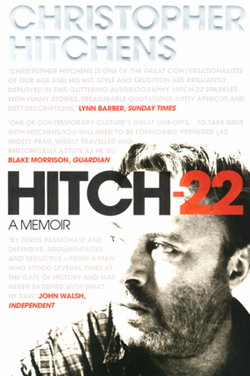With an obvious tilt towards “Catch-22”, Joseph Heller’s magnificent book reviewed here a few months ago, Hitch-22, with the subtitle A Memoir (ISBN 978-1-8435-922-2, Atlantic Books, 2010) is an autobiography by Englishman Christopher Hitchens.
In many ways, Hitchens comes across as the result of the era in which he was raised. A naval officer father, a remote figure always referred to as “The Commander”, even though he was not always that rank, and a mother who separated from the family to live with another man, and eventually was part of a double suicide. The loss of his mother, called Yvonne by Hitchens, again showing the family gulf, obviously affected him as a young man, and psychologists would have a field day with his analysis, pointing out that his earlier sexual ambivalence was probably the result of this upbringing.

The book covers the entire lifespan from his birth in 1949 through to today where he is now living with an esophageal cancer, and with his own brand of atheism is certainly not in God’s waiting room (though Hitchens would spell “God” in lower case “god”).
His early political leanings to the left are ones that are shared by most young university intellectuals, reaching their outward protests and sit-ins with out much depth to their beliefs. As one gets older and more mature (“wiser” would be incorrect), these leanings change, and Hitchens describes his vacillation through life, currently describing himself as no longer a ‘socialist’ but still a Marxist as well as a neo-conservative. He also managed to be given a spanking by Maggie Thatcher, and sleep with two of her party members. All very confusing, but also all very understandable when you regard the intellect of this man and his deliberate, at times, stance to be provocative.
Hitchens writes of his travels and travails around the world, and the many causes that he has espoused, including the unification of Ireland and the condemnation of military torture.
He became a very public face with his support of the war in Iraq, but as a young man had been against the involvement of the west in the war in Vietnam, but now believed it was America’s duty to depose Saddam Hussein, despite the cost. He also was one of the few journalists to deny the Weapons of Mass Destruction hysteria.
At B. 530 from the Bookazine shelves, it is top money for a wonderfully obtuse book, which will keep you interested from cover to cover, though you have to do it in small bites, as otherwise the plethora of names in the memoirs begins to read like a Yellow Pages entry under the heading of Intelligentsia.
I did enjoy it, despite that, but it did take much longer to digest than I would have imagined initially. It is also very British-based (up till 1981 when he emigrates to the USA), going through the better known universities of Oxford and Cambridge (both somewhat of an anachronism these days, I feel) and then the peerage and its representation in the political parties of the day.
All in all, a very interesting and extremely opinionated chap.




